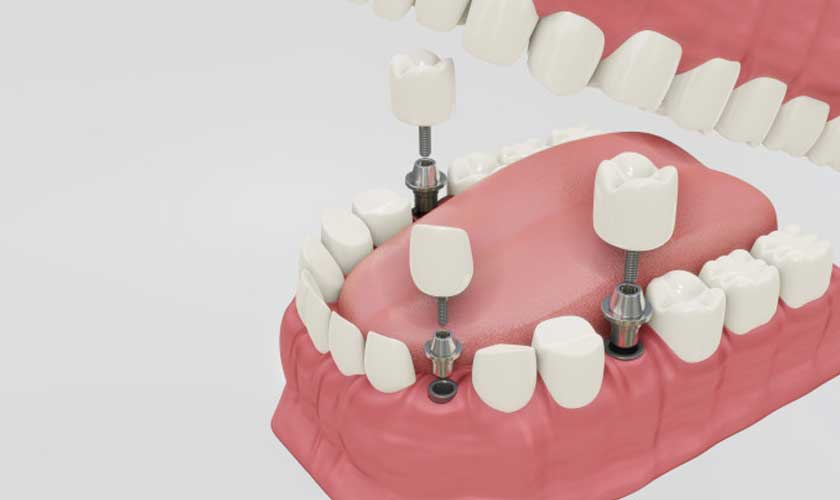Your teeth are essential for your overall health. Tooth decay, gum disease, and other dental issues are bad for you, but missing teeth can also negatively affect many aspects of your health. Let’s look at the main reasons for missing teeth:
4 Main Causes of Missing Teeth
Tooth loss is a natural process that occurs with age, but young people also lose their teeth. The most common causes of missing teeth include:
- Gum disease. Gum disease (periodontal disease) is an inflammatory chronic condition in which your gums become inflamed and start to recede. Advanced stages of this disease are characterized by bone deterioration and tooth loss. The common symptoms of gum disease include gum inflammation, bleeding, and discomfort. Periodontal disease is primarily caused by poor dental hygiene or genetics. This condition is considered the most common reason for tooth loss in middle-aged and elderly patients.
- Genetics. Genetic factors cause congenitally missing teeth and this condition often runs in families.
- Dental trauma. Dental injury is common in younger patients that may occur during high-contact sports, a fight, or by falling off a skateboard or bicycle.
- Tooth decay. Tooth decay is provoked by certain harmful bacteria in your mouth. Eating too much sugar causes these bacteria to form the plaque that accumulates on your teeth and wears down the enamel. Tooth decay tends to occur at any age. But it can be prevented by proper dental hygiene, regular dental checkups, and a healthy sugar-free diet.
Fortunately, most causes of missing teeth are preventable. Keep in mind that you might not have all of your teeth forever. Once you’ve lost your tooth or teeth, you should replace them. Here are five weighty reasons to replace your missing teeth:
1. Missing teeth can negatively affect the appearance of your face
Missing teeth change the appearance of your face over time making it look older. The more missing teeth in your mouth, the closer your chin and nose become. Your lips may turn downwards into a frown. Your face will look shorter than it should be.
2. Missing teeth negatively affect your overall health
Missing teeth impact the ability to chew food properly. This means you might miss out on your favorite foods and even have poor well-being.
Not being able to chew certain foods often results in deficiencies in different nutrients. Most nutrients are contained in solid foods. Nutrient deficiencies cause various health issues including digestive issues, skin disorders, and dementia.
Missing teeth affect mental health as well. Many people with missing teeth experience a loss of confidence and try to hide their smile as much as possible.
3. There are some effective treatments to replace missing teeth
Modern dentistry is fantastic. Doctors can solve the problem of missing teeth in different ways. Let’s look at some options that successfully replace missing teeth:
- Dental implants. Dental implants are considered the best treatment option for missing teeth. Small titanium tooth roots surgically installed into your jaw. This treatment helps form a durable tooth root alternative that will help your jawbone and the gum line stay healthy. An abutment covered by a dental crown is then placed on top of the implant.
- Dentures. Dentures are removable replacements for missing teeth. They are available as partial dentures and complete dentures.
- Dental bridges. A row of artificial teeth, which can replace a single tooth or multiple missing teeth by being cemented onto the remaining teeth on either side.
4. Missing teeth may cause bone deterioration
If you have a missing tooth your remaining teeth start to move towards the position of the previous tooth. This movement often leads to crooked or misaligned teeth. Missing teeth also lead to deterioration of the jaw bone since it reduces in density and volume. This is a serious issue because it results in a loss of structural support in your mouth and weakens the remaining teeth. It also creates a more difficult cleaning surface. Untreated missing teeth will eventually contribute to gum disease.
5. Treatment of missing teeth becomes more expensive and difficult later
If you think that replacing your missing teeth is expensive and you want to prolong the need for treatment, you should know that the treatment of missing teeth is much more expensive and difficult later. It’s harder to insert dental implants when the amount or quality of jaw bone has already deteriorated. This doesn’t mean that dental implants aren’t your option, but you might also need a bone graft if there isn’t sufficient bone volume to support the dental implant.
The Bottom Line
Don’t delay a visit to your dentist if you have a missing tooth. One missing tooth can cause other teeth to fall out making your treatment more expensive and difficult.
